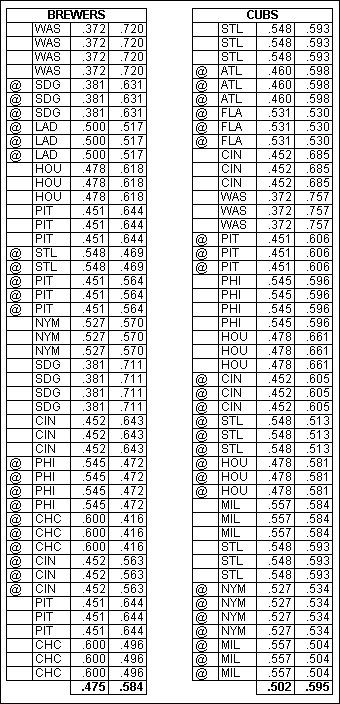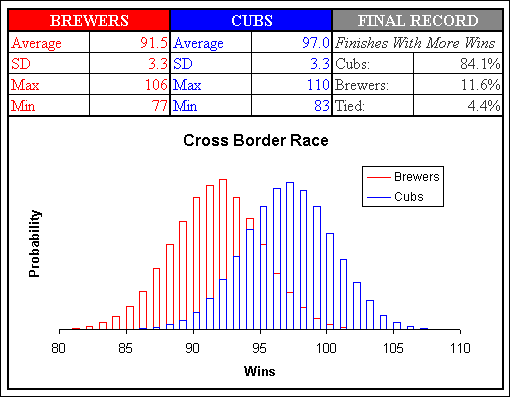Strength of Schedule and Catching the Cubs
With the Brewers sitting five games back of the Cubs in the NL central and with all signs pointing to the Cubs being the best team in the National League, it's time for Brewer fans to set their sites on the wildcard, right? According to some, if you consider the strength of schedules difference between the Cubs and Brewers, we might actually expect the Brewers to catch the Cubs. Could strength of schedule over 47 games really make that big of a difference? I can't imagine it but let's run the numbers and find out.
When people refer to strength of schedule, they are usually talking about the cumulative win percentage of a team's opponents. Even after 120+ games, a team's record might still not represent their true collective talent very well but let's just roll with it for this excercise:

The first column is the win percentage of each opponent. The second column is the probability of the Brewers or Cubs beating that opponent, using the log5 method ( illustrated here).
The cumulative win percentage for the Brewers' remaining opponents is .475. For the Cubs, it's .502. How many wins does that strength of schedule advantage translate into? Both teams have 47 games remaining, so roughly:
47 x (.502 - .475) = 1.3 extra wins than the Cubs
While the Brewers are on pace for about 90 wins, their relatively easy schedule might allow them to get about 91 or 92 wins. That's not going to make up a five game lead, but to make sure my back-of-the-envelope calculations are reasonable, let's simulate the rest of the season using those win probabilities from the previous graph:

All that easier strength of schedule does let the Brewers keep pace with the Cubs. The Cubs are simply the better team according to their overall record and just about any other metric you can dig up. That 1.3 game advantage in SOS is basically eaten up by their respective talent differences.
Just from luck alone, the Brewers still have around a 16% chance of catching the Cubs (11.6% + 4.4%) but that's not much to hang your hopes on. For me, if the Brewers catch the Cubs, great. But the playoffs are the playoffs, so the wild card would be just fine.
The Cubs and Cardinals start a three game series on Friday. Go Cubbies! :)
When people refer to strength of schedule, they are usually talking about the cumulative win percentage of a team's opponents. Even after 120+ games, a team's record might still not represent their true collective talent very well but let's just roll with it for this excercise:

The first column is the win percentage of each opponent. The second column is the probability of the Brewers or Cubs beating that opponent, using the log5 method ( illustrated here).
The cumulative win percentage for the Brewers' remaining opponents is .475. For the Cubs, it's .502. How many wins does that strength of schedule advantage translate into? Both teams have 47 games remaining, so roughly:
47 x (.502 - .475) = 1.3 extra wins than the Cubs
While the Brewers are on pace for about 90 wins, their relatively easy schedule might allow them to get about 91 or 92 wins. That's not going to make up a five game lead, but to make sure my back-of-the-envelope calculations are reasonable, let's simulate the rest of the season using those win probabilities from the previous graph:

All that easier strength of schedule does let the Brewers keep pace with the Cubs. The Cubs are simply the better team according to their overall record and just about any other metric you can dig up. That 1.3 game advantage in SOS is basically eaten up by their respective talent differences.
Just from luck alone, the Brewers still have around a 16% chance of catching the Cubs (11.6% + 4.4%) but that's not much to hang your hopes on. For me, if the Brewers catch the Cubs, great. But the playoffs are the playoffs, so the wild card would be just fine.
The Cubs and Cardinals start a three game series on Friday. Go Cubbies! :)

1 Comments:
Interesting calculations. Makes good sense. Thanks for laying it out so clearly.
Speaking for myself, I am fine with the Wild Card. Post-season baseball of any variety would be more than acceptable.
Post a Comment
<< Home